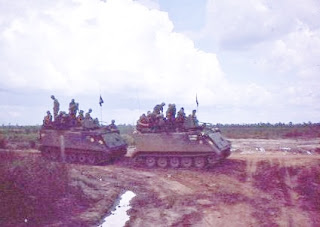by Glenn N. Holliman
Memories continued of a war in 1969....
By 1969, the U.S. Army felt the strains of a war that was dividing America, a protracted struggle in Vietnam. The year for my service, January 31, 1969 to January 30, 1970, was shared with over 540,000 other Americans. My Army division, the famed 1st Infantry of World War I and II combat, was composed mainly of draftees and career officers serving a second tour of duty in country.
Right, 22 years old, skinny, a college graduate in Lai Khe, Vietnam. I had most of my life yet to be lived....
I remember composing a letter while on day time guard duty in a tower over looking a portion of the perimeter of Lai Kai, headquarters for the Division and 3rd Brigade. In that epistle I noted that for four years the Division had occupied territory 40 miles of so northwest of Saigon, pushing against the Cambodia border. And for four years the same ground had been contested between the U.S. forces and Viet Cong and North Vietnam troops.
True, the U.S. never lost a full-blown battle, but the night belonged to the V.C. The mighty pay loads of our B-52 bombers could blow apart tunnel complexes of the enemy, when such could be found. Our technology was overwhelming when an adversary would stand and fight, but this was a different, confounding war.
A 1st Infantry bunker with action in the background outside the perimeter. 1969
The V.C. fought the war against American conventional might, not in stand up battles, but rather by controlling the villages in the dark, ambushing high value targets such as convoys and forever harassing the Army and then disappearing into the bush or jungle.
The North Vietnamese took horrific casualties, but just as had George Washington with the British, they had only to remain a force in being, and to wait until the Americans tired of the loss in blood and treasure and went home.
And that is exactly what happened.
In 1969, moral among U.S. troops was slipping. I remember one night in barracks hearing a loud explosion, not incoming mortars or rockets, but that of a grenade. A young officer, overbearing with his enlisted men, had been 'fragged' by one of his troops, i.e. a live grenade rolled into his quarters. Wounded, he lived.
Drugs were becoming a problem. I remember waking up in the middle of the night at a Fire Support Base by a young lieutenant rummaging through the medic's bag looking for pain killers. Another night walking through the barracks, waking soldier's for guard duty, I stumbled across troops smoking dope.

Another time I discussed with the enlisted men in the field what it was like to patrol in the bush.
"Our 2nd lieutenant said he had only one mission here and that was to keep us alive until we could all go home."
The desire to engage and defeat an enemy was rare among the troops in 1969. Being a senior enlisted man or conscientiousness officer was not easy with an army of draftees. Not easy when the USA was torn apart by anti-war marches and race riots. The 1960s were destructive for America. Our nation had a lot of self-inflicted wounds.
Above and below, a patrol on Thunder Road, aka Highway 13. In 1969 a muddy track and conflicted. By 2015, a paved highway was lined with apartment and business office complexes!
The government in Saigon, propped up by U.S. monies and supplies, was wobbly and the Army of the Republic of Vietnam (ARVN) loath to expend itself. The will to win lay with North Vietnam, fighting a classic war of independence and a perceived puppet government still control by westerners. The South Vietnamese soldier above had his military intelligence office next to our chaplain's office in the 3rd Brigade Headquarters, Lai Khe.
That Christmas of 1969 the famed quintessential comedian of the 20th century, Bob Hope, came to Lai Khe came to entertain us. He brought some pretty girls and Neil Armstrong who had been the first man to step on the Moon five months before. In was incongruous - one of human kind's greatest feats justipositioned with one of human kind's great tragedies - warfare.
Bob Hope, a conservative patriot, announced to us that President Richard Nixon had a plan to end the war. Amazingly the troops - thousands of us - booed. Hope was taken aback, confused and stuttered, 'Yes, he really has a plan.' The writing was on the wall; the army of draftees had had it. We just wanted to go home.
Below, the Bob Hope field after the 1969 show before being 'policed'. A mail transport lands on the Lai Khe airfield. The company mess hall in the picture on the left.
In 2015, I walked the same ground, exactly where the above picture was taken in 1969. Below are rubber trees that now cover the same field. The mess hall long since gone. Left to right Dr. Jim Holliman and his wife Karen and my daughter, Grace who accompanied me on this emotional journey.
Next posting, more as an aged veteran returns and reflects....
 Joel shared pictures of his children and grandchildren which I scanned into my computer, and filed in my Euhal and Edna Holliman, Irondale, Alabama folder. He was exceedingly proud of his family, and took great pride in their success and well being. (Joel and Anne in 2007)
Joel shared pictures of his children and grandchildren which I scanned into my computer, and filed in my Euhal and Edna Holliman, Irondale, Alabama folder. He was exceedingly proud of his family, and took great pride in their success and well being. (Joel and Anne in 2007)








